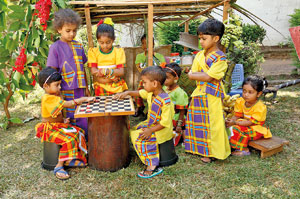The dawn of the ‘Aluth Avurudda’
 The ‘koha’ – cuckoo – gives the first signal that ‘Aluth Avurudda is round the corner. The mother of the household gets ready to prepare the traditional ‘avurudu kevili’. ‘Kevum’, ‘kokis’, ‘aasmi’ and ‘aggala’ are the priorities in her list. The father’s task is to clean the house, apply a coat of paint, tidy up the garden and cut a ‘kehel-kena’ – cluster of bananas – from a tree in the garden and see that it is well ripened to adorn the ‘avurudu kaema-mese’ – table of ‘specials’ for the New Year. Daughter(s) in the household will help mother in the preparation of the ‘kevili’. Sons will hang around waiting to taste the ‘kevum’ amidst protests by the mother who insists that they should be tasted only on ‘avurudu’ day.
The ‘koha’ – cuckoo – gives the first signal that ‘Aluth Avurudda is round the corner. The mother of the household gets ready to prepare the traditional ‘avurudu kevili’. ‘Kevum’, ‘kokis’, ‘aasmi’ and ‘aggala’ are the priorities in her list. The father’s task is to clean the house, apply a coat of paint, tidy up the garden and cut a ‘kehel-kena’ – cluster of bananas – from a tree in the garden and see that it is well ripened to adorn the ‘avurudu kaema-mese’ – table of ‘specials’ for the New Year. Daughter(s) in the household will help mother in the preparation of the ‘kevili’. Sons will hang around waiting to taste the ‘kevum’ amidst protests by the mother who insists that they should be tasted only on ‘avurudu’ day.
‘Avurudu’ is the national festival in
Sri Lanka when customs and traditions are followed to the very letter. Though
it is not a religious day, it is observed as a holy day by the Buddhists.
In the not too distant past, ‘Aluth Avurudda’ was the only time when the tasty Sri Lankan sweetmeats were prepared in homes. Then, ‘kevum’, ‘kokis’ and ‘aasmi’ were not available in boutiques. It was a tedious procedure but the mothers enjoyed preparing them. Sufficient quantities were made for consumption by the family as well as for distribution among the neighbours.
During the ‘nonagathe’ – the ‘forbidden time’ when the normal day to day work is stopped – many visit the temple, offer flowers, light the ‘polthel pahan’, recite the stanzas and get back home in time to observe the ‘avurudu chaarithra’ – the traditional customs. There are others who make the first visit in the New Year to the temple.
Betel is offered to the ‘lokuhamudurwo’ – the chief monk who will bless the family for a trouble-free year.
The children are told to avoid the normal day to day activities they are used to, during the ‘nonagathe’. They are encouraged to play or relax until the auspicious time for the
‘veda alleema’.
It’s the time children as well as adults play indoor games like ‘pancha demeema’ (playing with shells) and ‘daang edeema’ (draughts). Outdoor games are played after the ‘avurudu’ customs are completed more as community gatherings rather than family get-togethers.
‘Avurudu’ is also the time for new clothes which are bought to match with the colour(s) specified as the ‘lucky colour’ for the New Year. In the early days when there were no readymade clothes to be bought, the mother would buy cloth and stitch the clothes at home. There were hardly any households which did not have a sewing machine.
As the auspicious time to commence work for the New Year approaches, the family members clad in new clothes get ready to first read a book, then do some writing, before the males do some garden work and the females light the hearth. The children are encouraged to read a few paragraphs from their school books and write something relevant to their studies. The parents read a paragraph or two from a ‘bana potha’ or recite a stanza from the ‘pirith potha’.
The children are impatient to finish these activities so that they can partake in ‘ganudenu’. They would offer betel and worship the parents who will return the betel along with some cash. The younger ones will then worship the elder brothers and sisters, who in turn will reciprocate with a little ‘santhosam’. The family will then sit together for the first ‘avurudu’ meal when the mother will serve everyone. It is customary for everyone to taste a piece of ‘kiribath’ before proceeding to ‘kevum’, ‘kokis’ and other ‘kevili’.
The applying of oil is the next significant ‘avurudu’ event. In most villages, people gather at the temple and the chief monk performs the ceremony using a sheaf of leaves prescribed for the purpose, while chanting stanzas blessing each one of them. The oil is prepared in the temple according to the traditional method and those who are unable to come to the temple are given their share in advance. Facing the specified direction, the head of the family would apply the oil on each family member at the auspicious hour.
Although a date and time is given to resume work for the ‘aluth avurudda’, this is rarely observed by those who are employed. The village folk, particularly those who cultivate their own crops would still follow the custom with the belief that they will gather more harvest if they start work at the auspicious time.
While ‘avurudu’ customs help to maintain age old traditions and strengthen family bonds, they also play a significant role in promoting community harmony.


